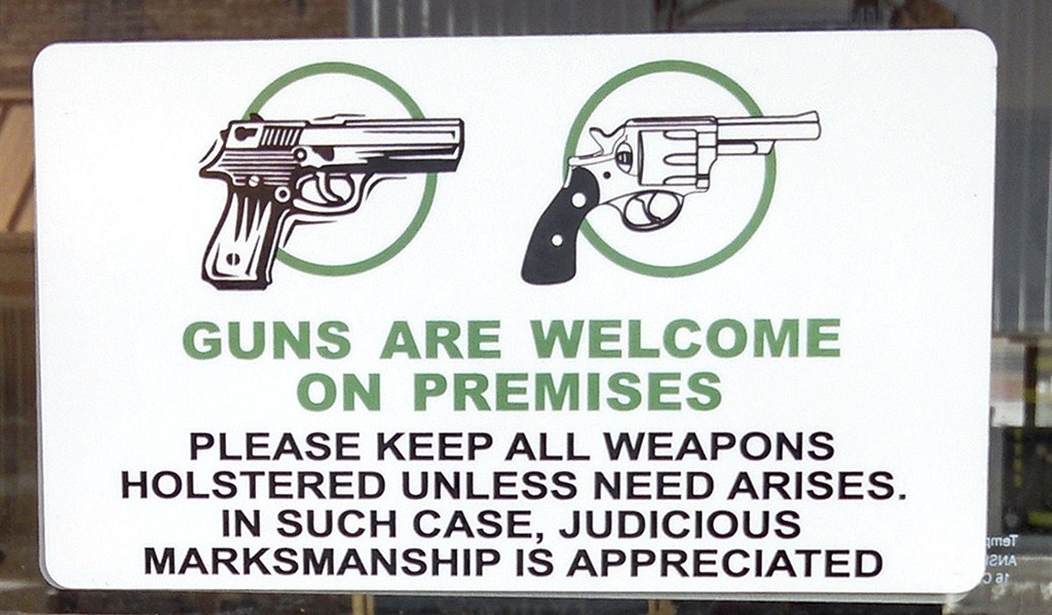The state of South Dakota already had some of the best gun laws in the nation from a pro-Second Amendment standpoint, including Constitutional Carry, but it's taken a few more steps in the right direction with Gov. Larry Rhoden officially signing several bills into law this week.
During a signing ceremony at a gunstock manufacturing company in Mitchell, South Dakota, Rhoden formally adopted several pieces of legislation that will remove the "gun-free" status of some places formerly off-limits to lawful carry... including public colleges and universities.
One bill allows people with an enhanced concealed-carry permit, or a reciprocal permit from another state, to carry concealed pistols on state university and technical college campuses. Requirements for an enhanced permit include a background check and completion of a handgun course. Types of enhanced permits are available to people as young as 18.
Pistols and ammunition must be stored in a locked case or safe when not being carried. Institutions may restrict firearms and ammunition in air-quality-controlled labs, locations requiring a security clearance, special events with metal detectors and armed security, and labs with flammable liquids, dangerous chemicals and hazardous gases.
The bill received few no votes but was the subject of impassioned testimony, including from Rep. Jim Halverson, R-Winner, a former state trooper who expressed concerns to his House colleagues about gun safety amid teenagers.
“A locked box in a dorm room just doesn’t seem like a good plan,” Halverson said.
Well, then, what's Halverson's plan to ensure that young adults have access to their right to keep and bear arms in a place where they spend the vast majority of their time? Or does he just believe that no student (or employee) on a public university should be able to exercise their Second Amendment rights?
Another bill prevents local governments from adopting any policy that restricts the concealed carry of firearms by their employees, officers and volunteers. It applies to government buildings, facilities and vehicles.
The portion of that bill that received the most pushback from opponents was a last-minute addition repealing a section of state law that bans concealed carry in bars.
“It’s unfortunate that this change didn’t even get a committee hearing,” said Nathan Sanderson of the South Dakota Retailers Association, in response to South Dakota Searchlight questions. “Small business owners deserved the opportunity to share how this law would impact them.”
The law only impacts these business owners in a positive way. If they want to allow concealed carry on the premises, they now are free to do so. If, on the other hand, they want to continue to prohibit concealed carry in their establishments, they still have that right as property owners, so long as they post the appropriate signage to let customers know they're entering a "gun-free zone."
Besides signing these bills into law, Rhoden also used the signing ceremony to inform reporters and the public that he's written a letter to AG Pam Bondi and interim ATF director (and FBI chief) Kash Patel asking them to review 27 CFR § 478.96, which imposes a 7-day waiting period on out-of-state sales of some firearms and restricted items like suppressors. As Rhoden detailed in his letter:
South Dakota is home to Silencer Central, the largest manufacturer and distributor of firearms suppressors in the nation. These hardworking folks want to help Americans freely exercise their Second Amendment rights. While wait times for eForm 4 approvals have improved substantially, this rule still hampers their ability to do business because firearms suppressors are also covered by 27 CFR § 478.96.
However, the law establishing this rule was passed decades before the Brady Handgun Violence Prevention Act of 1993. The Brady Act requires licensed firearms dealers to conduct background checks on all prospective firearm buyers. Since an individual seeking to purchase a suppressor would be subject to a Brady background check, the seven-day waiting period is an obsolete and unnecessary barrier to the free exercise of Americans' Second Amendment rights.
A slight modification to 27 CFR § 478.96, would represent a significant victory for the Second Amendment community across the nation without impacting any safety regulations. I simply ask that you strike the seven-day waiting period so that law-abiding Americans, who have already undergone a Brady background check, can exercise their Second Amendment rights without unnecessary delay.
This particular delay is the result of a government regulation, not a law written by Congress, so it could be formally undone without the House and Senate's approval. Whether or not that happens, though, remains to be seen.
We'll be talking more about the pro-gun bills Rhoden signed into law on Thursday's Bearing Arms' Cam & Co with state Sen. Mykala Voita, who was the prime sponsor of the campus carry legislation. It should be a great conversation, and I encourage you to tune in!








